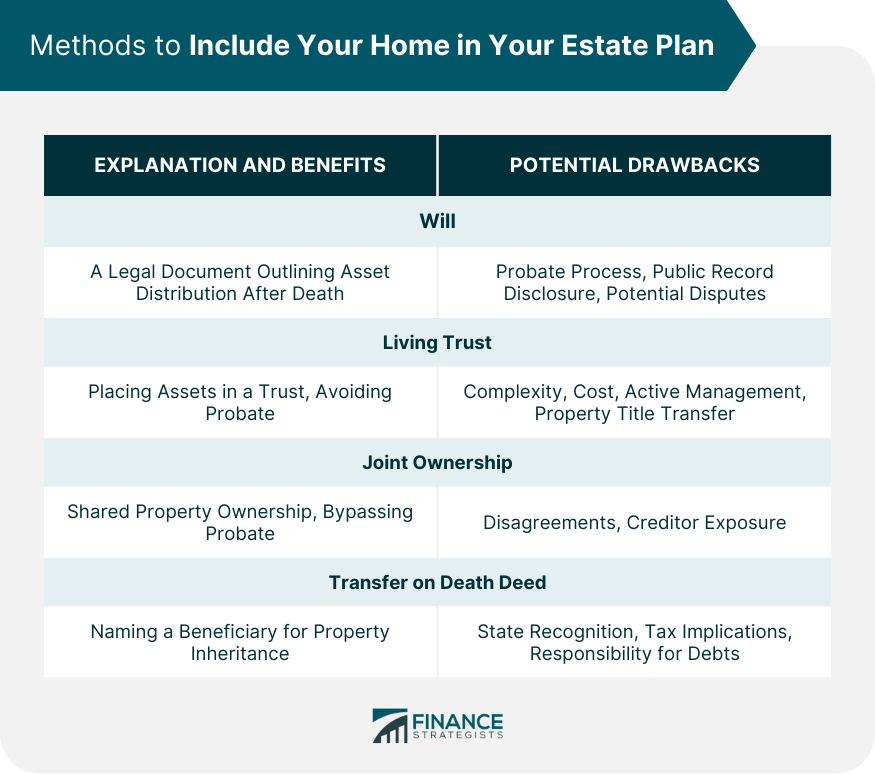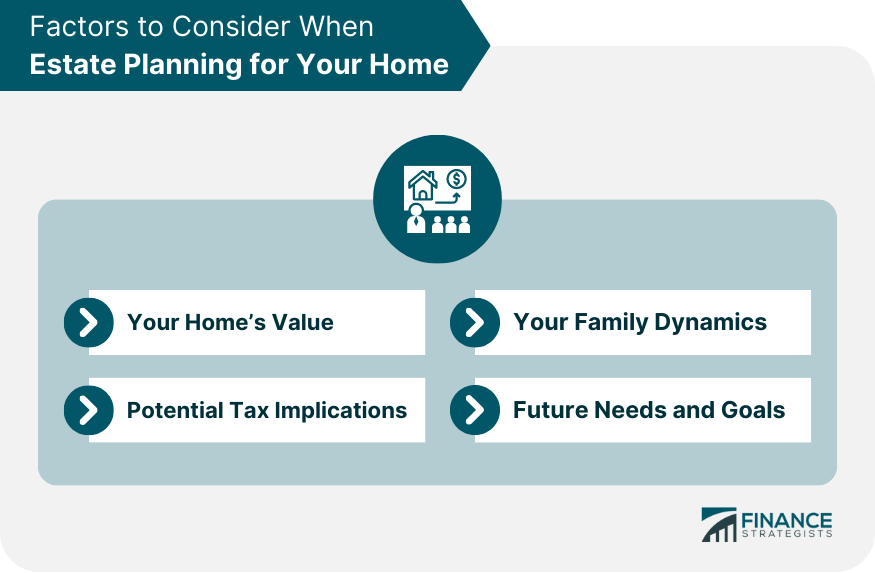Estate planning for your home refers to the process of making decisions about the management and distribution of your residential property upon your death or incapacity. The purpose of this process is to ensure that your home is handled according to your wishes, minimizing disputes among heirs and potential tax implications. It includes instruments such as a will, a living trust, joint ownership, and Transfer on Death Deeds, each tailored to fit unique scenarios. The impact on readers is significant as it emphasizes the necessity of planning, regardless of estate size. It provides insights into understanding the probate process, potential tax issues, and the role of legal professionals in crafting an effective plan. Estate planning for your home is a critical component of overall financial planning, affecting not only asset disposition but also the financial and emotional well-being of your loved ones after your death or incapacity. A will is a legal document that outlines your wishes regarding the distribution of your assets, including your home, after your death. It provides clarity and reduces potential disputes among heirs. However, a will does not avoid probate—a legal process that can be time-consuming and costly. Plus, the contents of a will become a public record once probated, potentially compromising privacy. A living trust is an estate planning tool that allows you to place your assets, including your home, into a trust during your lifetime. Upon your death or incapacity, the property is managed or distributed by a trustee. A significant benefit of a living trust is that it avoids probate. Creating a living trust can be more complex and costly than drafting a will. Moreover, it requires active management, including transferring the title of the home to the trust. Joint ownership allows two or more individuals to own a property together. Upon the death of one owner, the property automatically passes to the surviving owner(s), bypassing probate. However, joint ownership can lead to disagreements about property use or maintenance. It also exposes the property to the creditors of all owners. A Transfer on Death (TOD) deed allows homeowners to name a beneficiary who will inherit the property upon their death without going through probate. TOD deeds are not recognized in all states, and even when they are, they may expose the beneficiary to unwanted tax implications or responsibility for the deceased's debts. The value of your home can significantly impact your estate planning strategy, particularly regarding potential tax implications and choosing the right distribution method. Certain estate planning tools can help reduce or delay estate and inheritance taxes. It's essential to understand these potential tax implications and plan accordingly. Family relationships and dynamics can also significantly influence your estate planning. Who you want to inherit your home, who can maintain it, and how to distribute it fairly among your heirs are important considerations. Your future needs, such as potential long-term care costs or desire to downsize, can influence how you include your home in your estate plan. Medicaid can often seek reimbursement from your estate after your death, including from the sale of your home. It's crucial to understand these estate recovery rules when planning for long-term care needs. Certain strategies, like irrevocable trusts or life estates, can protect your home from Medicaid estate recovery while maintaining your eligibility for benefits. Consult with a professional to understand these strategies better. The probate process involves validating your will, paying off debts, and distributing the remainder of your estate. Understanding this process is essential as it influences how and when your home is transferred after your death. Different estate planning tools require different legal documents, like deeds, wills, or trust documents. Ensure you understand the requirements and have the appropriate documents in place. An experienced estate planning attorney can guide you through the legal complexities, help draft necessary documents, and ensure your estate plan adheres to all legal requirements. Estate plans should be reviewed and updated regularly, especially after major life events like marriage, divorce, or the birth of a child. Ignoring potential tax implications can lead to hefty taxes for your heirs or the estate. Always consider taxes when estate planning. Estate planning is complex. Without professional advice, you may overlook crucial aspects, leading to potential disputes, tax issues, or other unwanted consequences. Estate planning for your home involves deciding its management or distribution upon your death or incapacity. Key methods include a will, a living trust, joint ownership, and a Transfer on Death Deed, each with unique benefits and drawbacks. The home's value, potential tax implications, family dynamics, future needs, and impact on Medicaid eligibility are all crucial factors in your planning process. Understanding the probate process and the necessary legal documents is fundamental. Engaging an estate planning attorney ensures your plan meets all legal requirements and best serves your interests. Regularly updating your plan, considering tax issues, and consulting professionals can mitigate potential disputes and unwanted consequences. Estate planning isn't just for the wealthy; it's a necessary process for anyone wanting to ensure their home's future aligns with their wishes.What Is Estate Planning for Your Home?
Different Ways to Include Your Home in Your Estate Plan
The Will
Explanation and Benefits of a Will
Potential Drawbacks of a Will
The Living Trust
Explanation and Benefits of a Living Trust
Potential Drawbacks of a Living Trust
Joint Ownership
Explanation and Benefits of Joint Ownership
Potential Drawbacks of Joint Ownership
Transfer on Death Deed
Explanation and Benefits of a Transfer on Death Deed
Potential Drawbacks of a Transfer on Death Deed

Factors to Consider When Estate Planning for Your Home
Your Home's Value
Potential Tax Implications
Your Family Dynamics
Future Needs and Goals

Estate Planning and Its Impact on Medicaid Eligibility
Estate Recovery Rules
Strategies to Protect Your Home
Legal Procedures for Transferring Your Home
Understanding the Probate Process
Required Legal Documents
Role of an Attorney
Mistakes to Avoid When Estate Planning for Your Home
Not Updating Your Plan
Overlooking Potential Tax Issues
Not Consulting With Professionals
The Bottom Line
Estate Planning for Your Home FAQs
Estate planning for your home is important because it allows you to decide what happens to one of your most valuable assets after your death or in case of incapacity. It provides an opportunity to ensure your home goes to the person you choose, can reduce potential disputes among heirs, and minimize potential tax implications.
There are several ways to include your home in your estate plan, such as through a will, a living trust, joint ownership, or a Transfer on Death deed. Each method has its benefits and drawbacks, so it's essential to consider your personal circumstances, family dynamics, and tax implications when making a decision.
Common mistakes in estate planning for your home include not updating your plan regularly, overlooking potential tax implications, and failing to consult with professionals. Estate planning is a complex process, and professional advice can ensure all necessary details are appropriately addressed.
Estate planning can impact Medicaid eligibility because Medicaid may seek reimbursement from your estate, including your home, after your death. However, certain strategies can protect your home from Medicaid estate recovery while still maintaining your eligibility for benefits.
An attorney plays a vital role in estate planning for your home by guiding you through the legal complexities, helping draft necessary documents, and ensuring your estate plan adheres to all legal requirements. Consulting with an attorney can ensure your estate plan meets your wishes and provides the best protection for your assets.
True Tamplin is a published author, public speaker, CEO of UpDigital, and founder of Finance Strategists.
True is a Certified Educator in Personal Finance (CEPF®), author of The Handy Financial Ratios Guide, a member of the Society for Advancing Business Editing and Writing, contributes to his financial education site, Finance Strategists, and has spoken to various financial communities such as the CFA Institute, as well as university students like his Alma mater, Biola University, where he received a bachelor of science in business and data analytics.
To learn more about True, visit his personal website or view his author profiles on Amazon, Nasdaq and Forbes.











